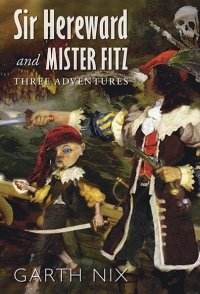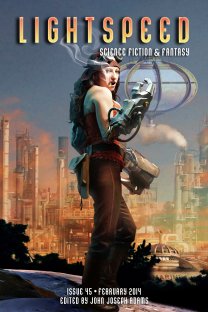Voices in Fantasy Literature, Part III
 This is the third installment in a series of posts highlighting fantasy short fiction (here are Part I and Part II).
This is the third installment in a series of posts highlighting fantasy short fiction (here are Part I and Part II).
Over the course of the last eight years, I’ve read or listened to a lot of short fiction and the variety out there is astonishing. And I love to try to introduce new readers to some of the stuff that impressed me. This week, the three stories I picked were by Garth Nix, Nancy Hightower, and Daniel Abraham.
“Hereward and Mr Fitz Go To War Again,” by Garth Nix, appeared originally in Jim Baen’s Universe, then in Podcastle (where I heard it), and then in a collection by Subterranean Press (ebook available here). This is one of three Sir Hereward and Mister Fitz stories I heard and I absolutely fell in love with the weird swashbuckling world Nix created.
Hereward is a knight, artillerist, and swordsman, as able with gunpowder as with the blade. Fitz is an animated wooden puppet and dangerous sorcerer, whose sorcery is structured around sewing and knitting, with his accouterments being needles, thread, and sometimes a portable sewing desk. Their job is to enforce a treaty against rogue gods that is so old that some of the nations to the treaty no longer exist.
This is pure buddy picture story, a grand adventures against old gods. Loads of fun and the Sir Hereward and Mister Fitz stories are now available as an ebook, so no reason not to check it out.
 “Merea,” by Nancy Hightower, is a departure from fantasy per se, appearing in Bourbon Penn, an online magazine of the odd, the surreal, and absurdist. The narrator has lost his wife in the desert, after they have lost a child. A year later, he returns to go into the desert, to seek out the power of memory and oblivion that has taken her.
“Merea,” by Nancy Hightower, is a departure from fantasy per se, appearing in Bourbon Penn, an online magazine of the odd, the surreal, and absurdist. The narrator has lost his wife in the desert, after they have lost a child. A year later, he returns to go into the desert, to seek out the power of memory and oblivion that has taken her.
He finds the underground city of Meréa, a world centered on a carnival of forgetfulness and loss and powerlessness. He persists through, respecting the powers that hold sway there, to find that the answers to his quest were partly outside and partly inside himself.
This story holds some beautiful and unconventional imagery like:
Meréa. Once discovered, the rules change. She grows with you. Unhinges her mouth to devour whatever memories you have, contracts the direction of her roads so you are always returning to the choices you didn’t make.
The last fantasy story I wanted to recommend to the world is The Cambist and Lord Iron: A Fairy Tale of Economics, by Daniel Abraham, originally appearing in John Klima’s anthology Longorrhea, and now available for free at both Lightspeed online and Podcastle in audio.
 This tale is more overtly speculative than literary, with a very personal examination of economics. The cambist in question (basically, a foreign currency exchanger in what seems to be a Victorian-era fantasy world) is trapped by Lord Iron, a most dangerous man, to exchange into pounds sterling some bills from a strange country.
This tale is more overtly speculative than literary, with a very personal examination of economics. The cambist in question (basically, a foreign currency exchanger in what seems to be a Victorian-era fantasy world) is trapped by Lord Iron, a most dangerous man, to exchange into pounds sterling some bills from a strange country.
The cambist by law has only twenty-four hours to do so or he must face a review by Lord Iron, who is very cruel. He cannot assign arbitrary value to the bills; that would also be grounds for a review (by Lord Iron).
The cambist uses clever economic theory to escape from the first challenge, but Lord Iron, unwilling to lose, comes back again and again, raising the stakes each time.
I never thought I’d be this excited about an economic fairy tale, but this one is amazing.
Learn more about Derek Künsken at his website, www.derekkunsken.com, or follow him on Twitter at @derekkunsken.
Top marks to the Hereward stories I’ve heard on Podcastle as well as the Cambist story. Those are some of my favorite stories on Podcastle.